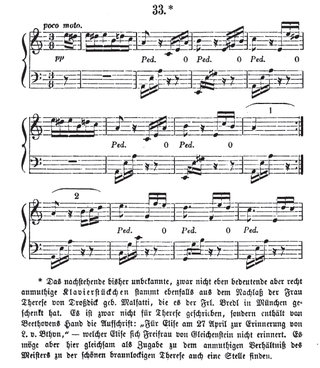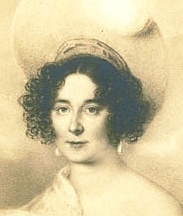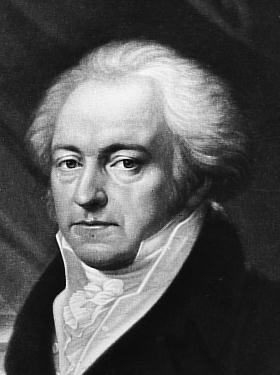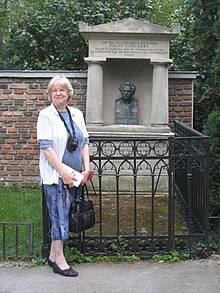
Franz Peter Schubert was an Austrian composer of the late Classical and early Romantic eras. Despite his short life, Schubert left behind a vast oeuvre, including more than 600 secular vocal works, seven complete symphonies, sacred music, operas, incidental music, and a large body of piano and chamber music. His major works include "Erlkönig", the Piano Quintet in A major, D. 667 , the Symphony No. 8 in B minor, D. 759 , the "Great" Symphony No. 9 in C major, D. 944, the String Quintet, the three last piano sonatas, the opera Fierrabras, the incidental music to the play Rosamunde, and the song cycles Die schöne Müllerin and Winterreise.

Bagatelle No. 25 in A minor for solo piano, commonly known as "Für Elise", is one of Ludwig van Beethoven's most popular compositions. It was not published during his lifetime, only being discovered 40 years after his death, and may be termed either a Bagatelle or an Albumblatt. The identity of "Elise" is unknown; researchers have suggested Therese Malfatti, Elisabeth Röckel, or Elise Barensfeld.

The Immortal Beloved is the addressee of a love letter which composer Ludwig van Beethoven wrote on 6 or 7 July 1812 in Teplitz in what would be today Czech Republic. The unsent letter is written in pencil on 10 small pages. It was found in the composer's estate following his death and is now in the Berlin State Library.
Maynard Elliott Solomon was an American music executive and musicologist, a co-founder of Vanguard Records as well as a music producer. Later, he became known for his biographical studies of Viennese Classical composers, specifically Beethoven, Mozart (biography), and Schubert. Solomon was the first to openly propose the highly disputed theory of Schubert's homosexuality in a scholarly setting.
Johann Chrysostomus Senn was a political lyric poet of the Vormärz.

Franz Adolf Friedrich Schober, since 1801 von Schober, was an Austrian poet, librettist, lithographer, actor in Breslau and Legationsrat in Weimar.

Baroness Therese von Droßdik was an Austrian musician and a close friend of Ludwig van Beethoven. She is best known as one of the possible dedicatees of Beethoven's famous bagatelle, Für Elise, WoO 59.

Josephine Brunsvik or Countess Jozefina Brunszvik de Korompa, Countess Josephine Deym, was probably the most important woman in the life of Ludwig van Beethoven, as documented by at least 15 love letters he wrote her where he called her his "only beloved", being "eternally devoted" to her and "forever faithful”. Several musicologists consider her to be the most likely recipient of the mysterious "Letter to the Immortal Beloved".

Joseph Ferdinand Sonnleithner was an Austrian librettist, theater director, archivist and lawyer. He was the son of Christoph Sonnleithner, brother of Ignaz von Sonnleithner and uncle of Franz Grillparzer and Leopold von Sonnleithner. He was a personal friend and attorney of Ludwig van Beethoven, and he wrote numerous librettos, among them, Beethoven's stage opera Fidelio, Faniska by Luigi Cherubini and Agnes Sorel by Adalbert Gyrowetz.

Johann Baptist Mayrhofer was an Austrian poet and librettist. He is best known for his close friendship with the composer Franz Schubert.

Johann Baptist Malfatti, Edler von Monteregio baptized as Giovanni Domenico Antonio Malfatti was an Italian/Austrian doctor famous for treating the composer Ludwig van Beethoven.

Julie "Giulietta" Guicciardi was an Austrian countess and briefly a piano student of Ludwig van Beethoven. He dedicated to her his Piano Sonata No. 14, later known as the Moonlight Sonata.

Leopold Kupelwieser was an Austrian painter, often associated with the Nazarene movement.

Ernst Hilmar was an Austrian librarian, editor, and musicologist.
Michael Lorenz is an Austrian musicologist, music teacher, musician, chess historian and photographer, noted as a Mozart scholar and for his archival work combining music history and genealogical research.
Johann Baptist Henneberg was an Austrian composer, pianist, organist and Kapellmeister.

Joseph Kupelwieser was an Austrian playwright, librettist, dramaturge and theatre director. Working at Vienna theatres for decades, he wrote the libretto for Franz Schubert's opera Fierrabras.
Sieghard Brandenburg was a German musicologist, who stood out especially as a Beethoven researcher.
Hans Schmidt was a German musicologist.

The Unsinnsgesellschaft was a brotherhood of artists in Vienna that met regularly from April 1817 to the end of 1818. Its members included important artists of the Biedermeier period such as August von Kloeber, Johann Nepomuk Hoechle, August Kopisch, Josef and Leopold Kupelwieser and Franz Schubert.














